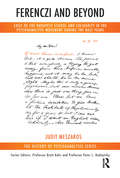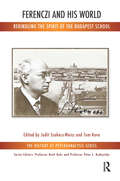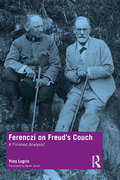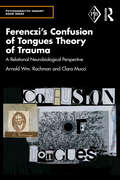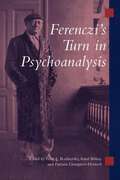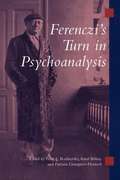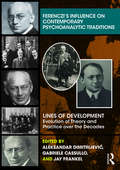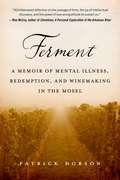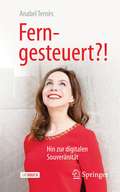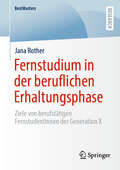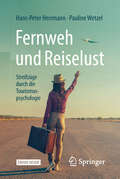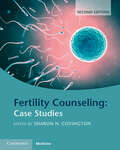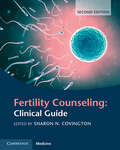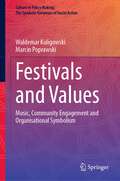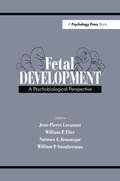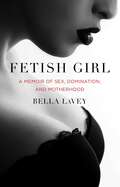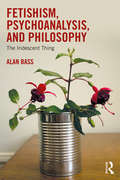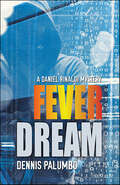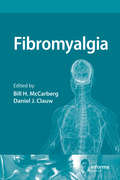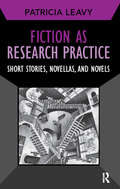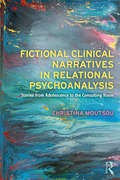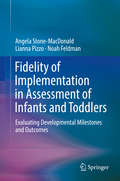- Table View
- List View
Ferenczi and Beyond: Exile of the Budapest School and Solidarity in the Psychoanalytic Movement During the Nazi Years (The History of Psychoanalysis Series)
by Judit MeszarosThis book explores how the Budapest School of Psychoanalysis took shape and examines the role played in it by Sandor Ferenczi. It integrates the Hungarian story of the "exile of the Budapest School" with an American perspective on "solidarity in the psychoanalytic movement during the Nazi years".
Ferenczi and His World: Rekindling the Spirit of the Budapest School (The History of Psychoanalysis Series)
by Judit Szekacs-Weisz Tom KeveThis volume honours Sandor Ferenczi, a central character in the birth of psychoanalysis, whose warm and passionate personality, ideas, and teachings permeate his world and his work, shaping psychoanalytical thinking of generations.
Ferenczi for Our Time: Theory and Practice (The History of Psychoanalysis Series)
by Judit Szekacs-Weisz Tom KeveFerenczi for Our Time stakes its greatest claim on the reader's attention by making manifest the contours of a distinctively Ferenczian tradition in the history of psychoanalysis, covering methodology, theory, and clinical practice in psychoanalysis.
Ferenczi on Freud’s Couch: A Finished Analysis?
by Yves LugrinThis fascinating book assesses Sándor Ferenczi’s role in the history of psychoanalysis, examining his personal analysis with Freud, the father of the discipline. The book delves into archival material to shed light on issues around transference between Freud and Ferenczi, as well as Ferenczi’s own development as "the first analyst." It offers a unique deciphering of the transmission of psychoanalysis, distinguishing between self-analysis, personal analysis and training analysis, including a discussion on the duration and end of treatment, subjects rarely discussed in contemporary circles. This book is an important read for practising clinicians and scholars alike.
Ferenczi's Confusion of Tongues Theory of Trauma: A Relational Neurobiological Perspective (Psychoanalytic Inquiry Book Series)
by Clara Mucci Arnold Wm. RachmanArnold Wm. Rachman and Clara Mucci provide a detailed examination of the significance of Sándor Ferenczi’s paradigm shifting theory of trauma, the Confusion of Tongues, and confirm its relevance for the psychoanalytic theory and analysis of trauma today. As the first alternative to Freud’s theory of the Oedipal complex, Ferenczi’s Confusion of Tongues theory expanded the theoretical and clinical boundaries of psychoanalysis to establish that psychological trauma as a result of childhood sexual abuse and trauma experiences are a significant contributing factor to the development of psychological disorders. The authors address the lack of attention paid to the significance of sexual abuse trauma to understanding psychological ill health in psychoanalysis, and integrate the latest research on neurobiology to demonstrate how Ferenczi’s theory is meaningful to understanding many aspects of human behavior today. This work will be formative to psychoanalysts and psychotherapists both in training and in practice and provide renewed insight into the treatment of childhood sexual abuse and psychological trauma.
Ferenczi's Turn in Psychoanalysis
by Patrizia Giampieri-Deutsch Peter L. Rudnytsky Antal BókaySigmund Freud's role in the history and development of psychoanalysis continues to be the standard by which others are judged. One of the most remarkable features of that history, however, is the exceptional caliber of the men and women Freud attracted as disciples and coworkers. One of the most influential, and perhaps overlooked, of them was the Hungarian analyst Sndor Ferenczi. Apart from Freud, Ferenczi is the analyst from that pioneering generation who addresses most immediately the concerns of contemporary psychoanalysts. In Ferenczi's Turn in Psychoanalysis fifteen eminent scholars and clinicians from six different countries provide a comprehensive and rigorous examination of Ferenczi's legacy. Although the contributors concur in their assessment of Ferenczi's stature, they often disagree in their judgments about his views and his place in the history of psychoanalysis. For some, he is a radically iconoclastic figure, whose greatest contributions lie in his challenge to Freudian orthodoxy; for others, he is ultimately a classical analyst, who built on Freud's foundations. Divided into three sections, Contexts and Continuities, Disciple and Dissident, and Theory and Technique, the essays in Ferenczi's Turn in Psychoanalysis invite the reader to take part in a dialogue, in which the questions are many and the answers open-ended.
Ferenczi's Turn in Psychoanalysis (Open Access Lib And Hc Ser.)
by Patrizia Giampieri-Deutsch Peter L. Rudnytsky Antal BókaySigmund Freud's role in the history and development of psychoanalysis continues to be the standard by which others are judged. One of the most remarkable features of that history, however, is the exceptional caliber of the men and women Freud attracted as disciples and coworkers. One of the most influential, and perhaps overlooked, of them was the Hungarian analyst Sndor Ferenczi. Apart from Freud, Ferenczi is the analyst from that pioneering generation who addresses most immediately the concerns of contemporary psychoanalysts. In Ferenczi's Turn in Psychoanalysis fifteen eminent scholars and clinicians from six different countries provide a comprehensive and rigorous examination of Ferenczi's legacy. Although the contributors concur in their assessment of Ferenczi's stature, they often disagree in their judgments about his views and his place in the history of psychoanalysis. For some, he is a radically iconoclastic figure, whose greatest contributions lie in his challenge to Freudian orthodoxy; for others, he is ultimately a classical analyst, who built on Freud's foundations. Divided into three sections, Contexts and Continuities, Disciple and Dissident, and Theory and Technique, the essays in Ferenczi's Turn in Psychoanalysis invite the reader to take part in a dialogue, in which the questions are many and the answers open-ended.
Ferenczi’s Influence on Contemporary Psychoanalytic Traditions: Lines of Development—-Evolution of Theory and Practice over the Decades
by Jay Frankel Aleksandar Dimitrijević Gabriele CassulloThis collection covers all the topics relevant for understanding the importance of Sándor Ferenczi and his influence on contemporary psychoanalysis. Pre-eminent Ferenczi scholars were solicited to contribute succint reviews of their fields of expertise. The book is divided in five sections. 'The historico-biographical' describes Ferenczi's childhood and student days, his marriage, brief analyses with Freud, his correspondences and contributions to daily press in Budapest, list of his patients' true identities, and a paper about his untimely death. 'The development of Ferenczi's ideas' reviews his ideas before his first encounter with psychoanalysis, his relationship with peers, friendship with Groddeck, emancipation from Freud, and review of the importance of his Clinical Diary. The third section reviews Ferenczi's clinical concepts and work: trauma, unwelcome child, wise baby, identification with aggressor, mutual analysis, and many others. In 'Echoes', we follow traces of Ferenczi's influence on virtually all traditions in contemporary psychoanalysis: interpersonal, independent, Kleinian, Lacanian, relational, etc.
Fermare la missione suicida: Un libro con una causa per fermare la missione suicida che continua
by Madhu RondaUn suicidio è il primo luogo un'azione sgradita. E' allarmante vedere che dopo il 2020 una morte viene predetta ogni 20 secondi. Le statistiche non sono tutte incoraggianti per le società (USA, Regno Unito) molto avanzate e sofisticate con tutte le risorse a portata di mano. Questo libro copre tutte le categorie delle cause per morti da suicidio. Esso punta a tutti gli schemi di salvataggio messi in pratica per l'OMS per prevenire i suicidi. Semplicemente, la vita mette alla prova le persone in luoghi e modi diversi e uno non dovrebbe piegarsi e finire una vita preziosa. La vita non dovrebbe essere sottomessa a uno schema di suicidio folle e stupido come quello degli attentatori di oggi. E' sciocco sottomettere la vita in nome di un sacrificio a Dio.
Ferment: A Memoir of Mental Illness, Redemption, and Winemaking in the Mosel
by Patrick DobsonA deeply moving account of one man&’s return to the German town where he first pursued a career in winemaking, and his attempt to reckon with the mental illness, alcoholism, and enduring relationships that defined the most formative chapter of his life.After an attempted suicide by hanging—with his son in the next room—author Patrick Dobson checks into a mental hospital, clueless, reeling from bone-crushing depression and tortuous, racing thoughts. A long overdue diagnosis of manic depression offers relief but brings his confused and eventful past into question.To make sense of his suicide attempt and deal with his past, he returns to Germany where, three decades earlier, he arrived as twenty-two-year-old—lost, drunk, and in the throes of untreated mental illness—in search of a new life and with dreams of becoming a winemaker. The sublime Mosel vineyards and the ancient city of Trier changed his life forever.Ferment charts his days in Trier&’s vineyards and cellars, and the enduring friendships that would define his life. A winemaker and his wife become like parents to him. In their son, he finds a brother, whose death years later sends Dobson into a suicidal tailspin. His friends, once apprentices like himself, become leaders in their fields: an art historian and church-restoration expert, an art- and architectural-glass craftsman, a painter and photographer, and a theologian/journalist. The relationships he builds with them become hallmarks of a life well-lived.In Ferment, Dobson reconnects with the people who stood by him through his dissolution and eventual recovery. In these relationships, he seeks who he was and how his time in Germany changed him. He peers into his memory to understand how manic depression and alcoholism affected who he was then and how his time in Germany made him who he&’s become.
Ferngesteuert?!: Hin zur digitalen Souveränität
by Anabel TernèsFerngesteuert oder digital souverän – wie leben Sie und wie möchten Sie leben? Das Buch Ferngesteuert?! Hin zur digitalen Souveränität entschlüsselt mit spannenden und lebendigen Beispielgeschichten die Hintergründe für unsere Verhaltensweisen im digitalen Alltag. Dieses Buch zeigt uns Möglichkeiten auf, wie wir aus einem bequemen digitalen Ferngesteuert-sein in unserem Alltag ausbrechen können. Dazu vermittelt es, wie wir zu mehr Lebensfreude finden, unserem Leben mehr Sinn geben und unsere Zukunft wieder selbst in die Hand nehmen können. Last but not least macht es Lust darauf, wieder selbst zu entscheiden - das eigene Leben in die Hand zu nehmen, Zukunft als Chance zur eigenverantwortlichen Selbstverwirklichung zu sehen und die Vorteile der Digitalisierung souverän im Leben umzusetzen. Zur Autorin: Anabel Ternès ist eine der führenden Köpfe für Digitalisierungsthemen in Deutschland. Als Digitalunternehmerin, Zukunftsexpertin, Autorin, Verwaltungsrätin und Professorin mit einem großen Engagement für Kinderrechte, Bildung und gesunde werteorientierte Digitalisierung sieht und bewegt Anabel Ternès von Hattburg die großen Herausforderungen, die gelöst werden müssen, um unsere Demokratie und soziale Marktwirtschaft in eine lebenswerte Zukunft für alle zu führen.
Fernstudium in der beruflichen Erhaltungsphase: Ziele von berufstätigen Fernstudentinnen der Generation X (BestMasters)
by Jana RotherDas vorliegende Buch ist mit der Untersuchung der Ziele berufstätiger Fernstudentinnen der Generation X bei der Entscheidung für ein Hochschulstudium einem Thema von hoher Relevanz gewidmet. Die Zielgruppe steht in vielen Fällen bereits unter der Mehrfachbelastung von Beruf und Kindererziehung oder Pflege innerhalb der Familie. Zudem kann das Streben nach einem Bildungsabschluss in der beruflichen Erhaltungsphase mit normativen Erwartungen kollidieren, da dies vom optimalen beruflichen Zeitplan abweicht und aus biologischer und gesellschaftlicher Sicht eine erhöhte Anstrengung erfordert. Das Ziel der interdisziplinären und aktuellen Analyse besteht in der Zusammenstellung von Motivatoren, Bedürfnissen und beruflichen Zielen sowie der Ableitung von Handlungsansätzen zur Förderung der beruflichen Weiterbildung von berufstätigen Frauen der Generation X im Rahmen von Demografiemanagement. Dieses wurde über eine qualitative Interviewstudie mit Psychologie-Fernstudentinnen umgesetzt.
Fernweh und Reiselust - Streifzüge durch die Tourismuspsychologie
by Hans-Peter Herrmann Pauline WetzelDieses Sachbuch befasst sich auf unterhaltsame Weise mit der psychologischen Seite des Reisens. Wie der Buchtitel bereits erahnen lässt, erfährt der Leser in 40 kurzen Kapiteln wesentliche Entscheidungs- und Handlungsweisen. Diese werden dem Leser eindrücklich und unterhaltsam mittels psychologischer Erklärungen nahegebracht. Das Sachbuch umspannt einen weiten Themenbogen: von der Werbebegegnung und Entstehung von Reisewünschen über Reiseentscheidungsprobleme bis hin zum Phänomen Urlaubsstress. Auch allseits interessante Themen wie Zeiterleben, Flugangst, Jetlag, Reiseverhalten oder Urlaubsglück fehlen nicht bei den Streifzügen durch die Tourismuspsychologie. Das Sachbuch richtet sich an alle Leser, die sich für die psychologischen Sachverhalte entlang der gesamten Reisekette interessieren und mehr über ihr eigenes Reiseverhalten erfahren möchten. Es soll dem interessierten Leser helfen, seine eigenen Reiseentscheidungen besser zu verstehen und Urlaubserfahrungen sinnhafter reflektieren zu können. Die Beschreibungen sind mit zahlreichen aktuellen Fakten und Hintergrundinformationen versehen und vermitteln hierdurch auch prägnanten Einblick in das touristische System. Umrahmt werden die Texte durch thematisch passende Zeichnungen von Pauline Wetzel.
Fertility Counseling
by Sharon N. CovingtonUsing real-world cases, this clinical guide details the psychosocial challenges faced by patients navigating the world of medically assisted reproduction (MAR). It describes in depth the latest perspectives on counseling approaches to the evolving complexities of family creation, whether fertility issues are a presenting problem or occur during the course of therapy or the aftermath of a struggle with infertility. Applying an evidence-based, cross-border approach, international experts not only discuss advanced perspectives on topics such as third party reproduction, pregnancy loss and adoption, but also newer issues of fertility preservation, 'older' patient parenthood, LGBT and singles' family creation. A comprehensive resource, it explores pioneering insights into fertility counseling such as spirituality, developing disclosure language, a counselor's personal fertility issues, and more. This is an essential aid for medical and mental health professionals to develop and refine the skills needed to treat the increasingly diverse and complex needs of MAR patients.
Fertility Counseling: Case Studies
by Sharon CovingtonThis second edition of the essential guide for reproductive professionals is now available in a Clinical Guide and a Case Studies Guide, presenting the most current knowledge on counseling patients with diverse needs amidst rapidly advancing modern technology. The Case Studies guide relates the accessible, real-world experiences and perspectives as leading international practitioners share their stories applying clinical concepts to treatment practice. Chapters cover current, unaddressed and emerging areas in reproductive mental health including consequences of direct-to-consumer DNA testing, racial and cultural sensitivity and tele-mental health. Among the new topics are transgender ART, recurrent pregnancy loss, post-partum adjustment, and the pregnant therapist. For an in-depth presentation of clinical concepts, discover the Clinical Guide, which provides a foundational understanding of the medical and psychosocial experience of fertility treatment. An essential aid for medical and mental health professionals, this comprehensive guide allows clinicians to develop and refine the skills required to address the increasingly complex needs of fertility patients.
Fertility Counseling: Clinical Guide
by Sharon CovingtonThe second edition of the essential guide for reproductive professionals is now available in a Clinical Guide and a Case Studies Guide, presenting the most current knowledge on counseling diverse patients amidst rapidly advancing modern technology. Follow an in-depth presentation of clinical concepts in this Clinical Guide for a foundational understanding of the medical and psychosocial experience of fertility treatment. Explore the areas of reproductive psychology, therapeutic approaches, assessment and preparation in assisted reproduction, addressing the needs of diverse populations, and clinical practice issues. Featuring new topics such as transgender ART, recurrent pregnancy loss, post-partum adjustment, and the pregnant therapist. Then in Case Studies, discover the accessible, real-world experiences and perspectives as leading international practitioners share their stories applying clinical concepts to treatment practice. An essential aid for medical and mental health professionals, this comprehensive guide allows clinicians to develop and refine the skills required to address the increasingly complex psychosocial needs of fertility patients.
Festivals and Values: Music, Community Engagement and Organisational Symbolism (Culture in Policy Making: The Symbolic Universes of Social Action)
by Waldemar Kuligowski Marcin PoprawskiThis is an original book, covering all the past areas of research anyone would need to know about festivals and ‘event-based culture’. It is based on academic research but written in a way relevant for cultural professionals – uniquely explaining the cultural power of festivals, and with original empirical research, the realities of organisation and management, and social and economic value. Dr Jonathan Vickery, Reader in Cultural Policy Studies and Director: Centre for Cultural and Media Policy Studies, Univeristy of Warwick.This book discusses music festivals in the context of the specific values they convey. Today, music festivals are a permanent feature of national, regional and local cultural policies, a valuable asset in the tourism industry and a significant source of income for an industry that has been adversely affected by the steady decline in physical sales of music. For the audience, on the other hand, it is an opportunity to escape from everyday life, multi-sensory contact with art, an activity that stands for “full-body participation”– a cultural phenomenon that drags people out of their homes like no other. There is one common denominator linking the above-mentioned features of contemporary music festivals – namely the world of values. This is evident from the non-accidental locations, festivals spaces’ design, planning and the line-ups created consciously, with great care. The organisers’ “missions”, logos, and other symbolic organisational artefacts communicate specific values. These values are explicitly mentioned by artists and audiences: they can be easily identified in online forums and media reports; participant behaviour, festival “rituals” and additional festival programs are shaped on the basis of values, and cooperation is built between the festival and the local community. As the reader will quickly realize, numbers and statistics sit alongside descriptions and quotations in this book, and the organisers’ statements are accompanied by the opinions of academics, but above all the festival audience is given a voice – both through quotations and their drawings. This voice is by no means uniform, as it turned out that research into values was often transformed into a pretext for spinning tales about one’s life situation, one’s political preferences, and one’s understanding of freedom and responsibility. Memories were mixed with declarations, joy with regret, curses with dreams, prose with poetry. Thomas Pettitt was not wrong in noting that “Social history has learnt to appreciate festival as a valuable window on society and its structures”. The authors have tried to open all the windows available. Students and researchers in the fields of cultural anthropology, social psychology, folklore studies, comparative religion, sociology of culture, cultural policy, cultural history, and cultural management will find this book highly interesting.
Fetal Development: A Psychobiological Perspective
by Jean-Pierre Lecanuet William P. Fifer Norman A. Krasnegor William P. SmothermanBased on the presentations given by well-known specialists at a recent multidisciplinary conference of developmental psychobiologists, obstetricians, and physiologists, this book is the first exhaustive attempt to synthesize the present scientific knowledge on fetal behavior. Utilizing a psychobiological analytic approach, it provides the reader with an overview of the perspectives, hypotheses, and experimental results from a group of basic scientists and clinicians who conduct research to elucidate the role of fetal behavior in development. Experimental and clinical as well as human and animal data are explored via comparative developmental analysis. The ontogeny of fetal spontaneous activity -- via the maturation of "behavioral states" -- and of fetal responsiveness to sensory stimulation is studied in detail. Results are provided from studies of embryonic/fetal and newborn behavior in chicks, rats, sheep, primates, and humans. Knowledge of fetal behavior is crucial to the obstetrician, neonatologist, developmental psychologist, and even the future parents, in order to follow and assess the gradual development of spontaneous responsive movements of the fetus. While assessing this important information, this text also examines the neuro-behavioral events taking place during the fetal period as an aid to understanding normal and pathological life span development.
Fetish Girl: A Memoir of Sex, Domination, and Motherhood
by Bella LaVeyFetish Girl is a provocative, dark, and erotic memoir that tells it like it is. LaVey pulls readers into her evolving journey: dancer to stripper to dominatrix to erotic wrestler to BDSM aficionado—and all of this while being a single mother trying to do right by her son. This true story doesn&’t hold back from diving into these subcultures with a keen eye for the kinky, for the sexy, for the power of taking a risk. &“Fans of the Fifty Shades series will undoubtedly find much to savor in this ribald, risqué, and captivating remembrance.&” —Kirkus Review
Fetishism, Psychoanalysis, and Philosophy: The Iridescent Thing
by Alan BassFetishism, Psychoanalysis, and Philosophy explores how and why Freud’s late work on fetishism led to the beginnings of a re-formulation of the theory and practice of psychoanalysis. Freud himself, however, was unaware of the long history of the concept of fetishism, a history crucial to understanding the concept. This book contains three main thrusts. One is historical, tracing the development of the concept of fetishism from the 16th century onwards. The focus here is on two important thinkers: Charles de Brosses from the 18th century, and Auguste Comte from the 19th. The second thrust is philosophical. Fetishism is always about the relation between the mind and things. Martin Heidegger, Jaques Derrida, and Maurice Merleau-Ponty have made essential contributions in this area, contributions which have important scientific relevance. The third thrust integrate the historical, philosophical, and psychoanalytic investigations of fetishism. It also looks at Wallace Stevens’ poetic meditation on mind and thing, which helps to illuminate everything that precedes. This comprehensive book features careful integration of the historical, philosophical, and psychoanalytic investigations of fetishism. It will contribute to opening new ways of thinking about the mind and how it is structured, so that fetishism is possible. Fetishism, Psychoanalysis, and Philosophy will appeal to psychoanalysts and psychoanalytic psychotherapists as well as philosophy scholars.
Fever Dream: A Daniel Rinaldi Mystery (Daniel Rinaldi Thrillers #2)
by Dennis PalumboOn a blistering summer day, a bank robbery goes wrong, resulting in the deaths of all the hostages except Treva Williams. Pittsburgh psychologist and trauma expert Daniel Rinaldi is called in by the police to treat Treva. Soon an unforeseen series of events plunges the investigating officers, Sergeant Harry Polk, Detective Eleanor Lowrey, and Rinaldi into a vortex of mistaken identity, kidnapping, and surprising revelations about District Attorney Leland Sinclair's gubernatorial campaign. Is Sinclair somehow involved in the bank case?Rinaldi's attention is diverted by the suicide of a young patient and his growing attraction to Eleanor, as the recently-divorced Harry Polk spirals into an alcohol-driven, self-destructive free-fall. Then sudden death threats against Sinclair fuel a new frenzy of accusations and political maneuvering, and Rinaldi begins to make connections. Soon, what he knows—or thinks he knows—will pull him toward a shocking and possibly lethal confrontation.
Fibromyalgia
by Bill H. McCarberg Daniel J. ClauwUtilizing evidence-based research, this revolutionary source explores the difficult diagnosis and management of the controversial syndrome of fibromyalgia. Carefully guiding physicians through the steps leading to diagnosis, Fibromyalgia emphasizes targeting the underlying fibromyalgia syndrome rather than treating each of its symptoms individually
Fiction as Research Practice: Short Stories, Novellas, and Novels (Developing Qualitative Inquiry #11)
by Patricia LeavyThe turn to fiction as a social research practice is a natural extension of what many researchers and writers have long been doing. Patricia Leavy, a widely published qualitative researcher and a novelist, explores the overlaps and intersections between these two ways of understanding and describing human experience. She demonstrates the validity of literary experimentation to the qualitative researcher and how to incorporate these practices into research projects. Five short stories and excerpts from novellas and novels show these methods in action. This book is an essential methodological introduction for those interested in studying or practicing arts-based research.
Fictional Clinical Narratives in Relational Psychoanalysis: Stories from Adolescence to the Consulting Room
by Christina MoutsouFictional Clinical Narratives in Relational Psychoanalysis explores the therapeutic space between the patient and therapist in psychoanalysis and the transformative effect of the therapeutic relationship through a collection of twenty-two short stories beginning at a moment of trauma in adolescence. Christina Moutsou illustrates both contemporary clinical issues as well as the relational and intersubjective nature of the therapy relationship. First, six teenagers narrate in the first person their experience of battling with sexual abuse, eating disorder, body image, the first sexual awakening, loss of a parent and the intricacies of teenage friendship. The stories then unravel years later as adults in the consulting rooms of Ellie and Jake, two middle-aged therapists working in London. The reader is offered an intimate look at how the therapists work through their personal losses and past wounds, while facing their patients’ conflicts and dilemmas including adoption, bereavement, pregnancy loss, lack of intimacy in the couple relationship and a diagnosis of borderline personality disorder. What distinguishes this collection of fictional clinical narratives is the focus on an internal point of view, where the reader is invited to experience first-hand the tribulations of the psychoanalytic dialogue and the enduring marks that trauma and loss leave on each member of the therapeutic dyad. The focus here is on how narratives are constructed and deconstructed through the intersubjective dance between the therapist and the patient. Both are transformed in the process. The fictional nature of the stories also allows for the exploration of sensitive issues that are difficult or awkward to explore adequately using direct case studies from real-life examples. This fascinating and unusual work provides an innovative method of exploring everyday clinical dilemmas, using an accessible, easy to follow narrative path. It is written from a broadly relational perspective but will appeal to all psychoanalysts and psychoanalytic psychotherapists.
Fidelity of Implementation in Assessment of Infants and Toddlers: Evaluating Developmental Milestones And Outcomes
by Noah Feldman Angela Stone-MacDonald Lianna PizzoThis book examines the challenges in developmental assessment of infants and toddlers and provides best practices for implementing standardized assessments in early intervention settings. It starts with an overview of standardized assessment practices and discusses how specific tools can be used in early intervention for different purposes (e.g., eligibility for services). The book explains the importance of the Fidelity of Implementation of Assessment (FOI-A) approach in creating standardized assessment for infants and toddlers. Chapters provide a checklist-based framework for FOI-A, with details on technological supports for test administration and data collection as well as training and supervision models. In addition, chapters discuss ways of engaging families, gaining their trust, and including them in their children’s educational planning.Topics featured in this book include:The Battelle Development Inventory, 2nd Edition (BDI-2) and its use in the assessment of young children. Using checklists to improve fidelity of implementation for standardized assessments.Using checklists to support early intervention directors and teams.How to provide feedback to early interventionists and other professionals on FOI-A.Recommendations to improve FOI-A.Fidelity of Implementation in Assessment of Infants and Toddlers is a must-have resource for researchers, clinicians and related professionals, and graduate students in varied fields including child and school psychology, pediatrics, social work, behavioral therapy, infant and early childhood development, and early education and care.
